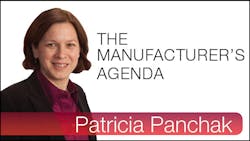What Open Chess Tournaments Tell Us About the Future of Manufacturing Robotics
At the recent MAPI Executive Summit, Michael Wynblatt, VP of Innovation and Emerging Technology at Ingersoll Rand, recounted an anecdote about human-robot teams at open chess tournaments that has stuck with me. What he described suggests new ways to supercharge manufacturing productivity -- especially on the factory floor.
Mr. Wynblatt (who, by the way, was featured in IndustryWeek's August 2011 cover story, "Smarter Product Development," when he was Eaton Corp's VP for engineering technology) pointed out that, in the world of open chess tournaments, which have few limits on who competes -- human, computer, or teams of humans and computers -- it isn't always the most powerful supercomputer or highest-ranking grandmaster that wins.
Now, we're all familiar with the story of how Deep Blue, IBM's chess-playing supercomputer, beat the reigning chess grand master Garry Kasparov back in 1997, and the resulting discussion: Will computers or artificial intelligence eventually trump human intelligence? The general consensus at the time: The ability to quickly compute chess moves, while impressive, doesn't come close to matching the thinking and learning capacity of the human brain.
While IBM rejected Kasparov's call for a rematch, it continued its effort to make supercomputers that could outsmart humans by thinking, and perhaps learning, like a human.
Fast-forward to Watson, the IBM supercomputer that beat the world's best human Jeopardy champions a little over two years ago. The game show, which required the computer to understand human language, as well as "learn" from each successive question/answer, is vastly more difficult for a computer than the game of chess -- and significantly more similar to thinking.
In a Tedx presentation last April, Jeopardy champion Ken Jennings described his feelings upon being defeated: “I felt obsolete. I felt like a Detroit factory worker in the ‘80s seeing a robot that could now do his job on the assembly line."
But the world of open chess had earlier suggested a different outcome.
None other than Kasparov himself, in a rather long, discursive review of the book, Chess Metaphors: Artificial Intelligence and the Human Mind, described these human v. machine contests -- including a discussion of the open chess tournaments to which Wynblatt referred at the MAPI event.
Kasparov's description of the open chess tournament's outcome is a nugget that manufacturing executives should ponder:
The surprise came at the conclusion of the event. The winner was revealed to be not a grandmaster with a state-of-the-art PC but a pair of amateur American chess players using three computers at the same time. Their skill at manipulating and “coaching” their computers to look very deeply into positions effectively counteracted the superior chess understanding of their grandmaster opponents and the greater computational power of other participants. Weak human + machine + better process was superior to a strong computer alone and, more remarkably, superior to a strong human + machine + inferior process.
As it is with chess players teaming up with computers, so it can be for skilled -- or perhaps even unskilled -- workers teaming up with robots. (I think most people already accept the idea that white collar, professional workers "team-up" with computer applications to achieve greater productivity.)
Indeed, IndustryWeek just last month posted an article describing how the latest robots -- now less expensive, safer, and easier to train than their predecessors -- make possible industrial robot-human teams that can vastly outperform either a human or a robot working alone, by having the human and the robot perform the tasks each does best.Perhaps more significant to me is the prospect of an opportunity in which low- and unskilled workers will be able to find a foothold in our nation's manufacturing economy. I've always believed that the company -- or country -- that can increase the productive capacity of the least productive of its members will ultimately be the most competitive and most profitable.
Perhaps the adoption of industrial robot-human teams will allow someone to test that theory.
What do you think?
NOTE: IndustryWeek was the media partner for the MAPI Executive Summit 2013.
About the Author
Patricia Panchak Blog
Editor-in-Chief
Focus: Competitiveness & Public Policy
Email: [email protected]
Follow on Twitter: @PPanchakIW
Call 216-931-9252
In her commentary and reporting for IndustryWeek, Editor-in-Chief Patricia Panchak covers world-class manufacturing industry strategies, best practices and public policy issues that affect manufacturers’ competitiveness. She delivers news and analysis—and reports the trends--in tax, trade and labor policy; federal, state and local government agencies and programs; and judicial, executive and legislative actions. As well, she shares case studies about how manufacturing executives can capitalize on the latest best practices to cut costs, boost productivity and increase profits.
As editor, she directs the strategic development of all IW editorial products, including the magazine, IndustryWeek.com, research and information products, and executive conferences.
An award-winning editor, Panchak received the 2004 Jesse H. Neal Business Journalism Award for Signed Commentary and helped her staff earn the 2004 Neal Award for Subject-Related Series. She also has earned the American Business Media’s Midwest Award for Editorial Courage and Integrity.
Patricia holds bachelor’s degrees in Journalism and English from Bowling Green State University and a master’s degree in Journalism from Ohio University’s E.W. Scripps School of Journalism. She lives in Cleveland Hts., Ohio, with her family.
